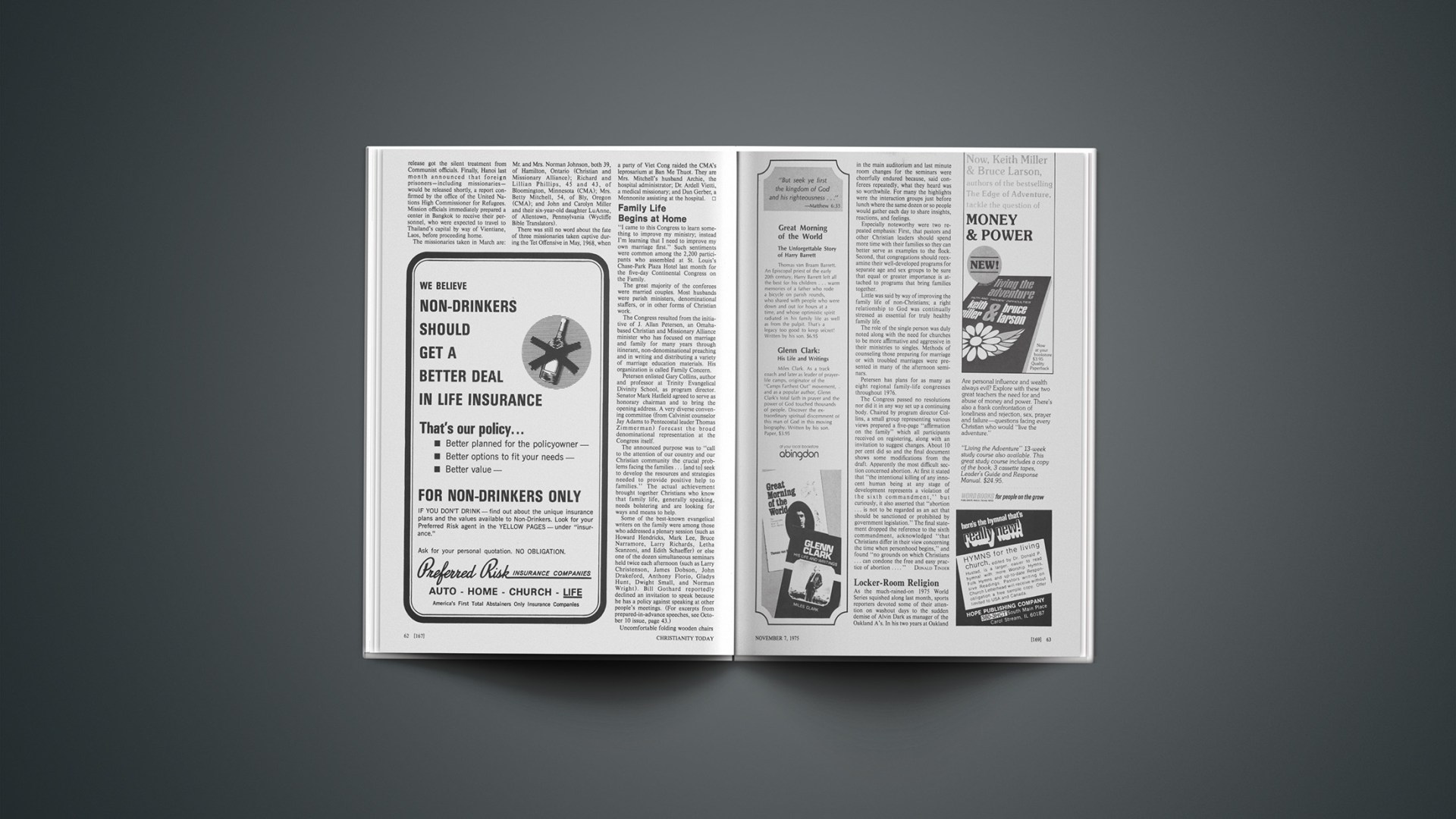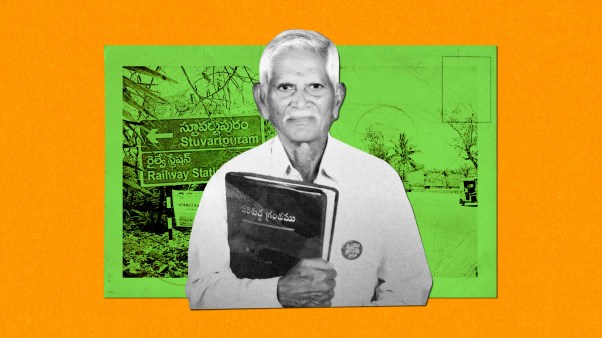Portugal’s rich west African colony of Angola, with a population of about six million, is supposed to get its independence November 11, but no one is prepared to say what kind of freedom will prevail.
Elections had been scheduled before independence day, but three warring parties have prevented the establishment of enough civil order in most places to conduct them. Adding to the instability of the situation is the struggle for power in Portugal, which has ruled the colony for nearly 500 years.
The movements began their fights to “liberate” the country from Portugal about fifteen years ago, but with Portugal now more than anxious to bring its troops home, the three groups have turned to fighting one another. They have received considerable aid from other governments within Africa and elsewhere in the world. All three have also received funds from the World Council of Churches since 1970.
Portugal has reiterated its plan to give up the colony on November 11, and fighting has intensified as the date has drawn closer.
Protestants, estimated at 450,000, have been growing since Portugal announced its plan to leave the colony. Catholicism had always been favored by the colonial governments, and Protestants were often oppressed if not persecuted. The latest estimate of the Catholic population is three million.
One phenomenon in the current state of tangled affairs is that the leader of each of the three warring parties has come from the Protestant minority. Agostinho Neto, leader of the Popular Movement for the Liberation of Angola (MPLA), the group that holds Luanda, the capital, comes from a Methodist background. Heading the group in control of a large part of southern Angola is Jonas M. Savimbi, who graduated from a school started by American Congregationalists and United Church of Canada missionaries before he went to Switzerland to earn a doctorate. His organization is known as the National Union for the Total Independence of Angola (UNITA). The third group, the National Front for the Liberation of Angola (FNLA), is headed by Holden Roberto, a Baptist.
All three have received massive support from abroad. Each of the parties is subsidized and encouraged by different governments in Africa as well as by major powers outside that continent. MPLA, which has gained the upper hand in Luanda as well as in the coastal cities, has received tons of military supplies from the Soviet Union as well as moral support from Portuguese Communists. Much of its support has come through the capital of the Republic of the Congo, Brazzaville. It has received $78,000 from the World Council of Churches, the largest amount earmarked by the WCC for any Angolan group from its Program to Combat Racism.
UNITA, the group tied to southern tribesmen, has received only $37,500 from the World Council. Foreign government support for this group is harder to document, but it is thought that both the United States and Red China have sent aid. Savimbi, the leader, describes his position as “moderate socialist.”
FNLA, which has been strongest in the northern region of Angola, has been identified for years with the neighboring nation of Zaire, and much of its support has come through that country’s capital, Kinshasa. Red Chinese advisers to its troops have trained FNLA men in Kinshasa. Recent disclosures in Washington indicated that this group was the choice of the American intelligence community from as early as the John Kennedy presidency. FNLA has received $60,500 from the Program to Combat Racism, a WCC spokesman told CHRISTIANITY TODAY.
All three parties have sent representatives, including some church leaders, to the United Nations to present their cause. Presentations have also been made to North American and European church leaders by the Angolans.
How the churches would fare if any one of the three groups gets control of the country has been the subject of considerable speculation. One of the unresolved questions is whether the foreign nations and groups that have helped the liberation movements would have influence over their policies concerning churches and missions. Older missions, some of them working in Angola since 1880, have generally turned over leadership in the church to Angolans. Methodist, Baptist, Brethren, and Angolan United Church activity has for the most part been confined to comity areas that followed old tribal boundaries.
The fighting between the groups has cost the lives of thousands of Angolans and Portuguese. Among those recently reported killed was an Angolan Methodist minister.
Over 300,000 Portuguese were expected to be evacuated from the colony before the November 11 deadline. With their departure, the country is losing nearly all its professionals, managers, and technicians. Medical services are virtually non-existent; one report said Luanda did not have a single dentist.
The combination of stepped-up war and the sudden evacuation of Portuguese workers has also brought transportation and communications to a virtual standstill. Among the results has been widespread hunger and, in some areas, starvation. Efforts to move relief goods into the affected areas have been stymied at nearly every turn.
Secular and religious relief agencies tried in vain to ship material aid to Luanda. One missionary packed two suitcases of seeds and checked them onto his flight, but when he reached Luanda the bags could not be found. The only seeds left for him to pass on to believers to plant next season were the few packed in carry-on bags.
Ecumenical forces attempted to mount a coordinated relief program this year, and the National Council of Churches sent $5,000 through Church World Service to get it started. The program failed, however, and the WCC then responded to the need by sending $10,000 each to the Methodist, Baptist, and Central (United Church) communities for material aid.
Church World Service (CWS) sent a staff member to Lisbon to try to book space on the planes going to Angola to pick up European refugees. Before the internationally sponsored shuttles ceased in October it was able to ship two lots of medical supplies to Nova Lisboa. A CWS spokesman emphasized that his agency was trying to send relief to the needy in all three areas. In addition to sending the medicines into the south, it sent funds for the purchase of goods in Luanda, and aid was dispatched to the FNLA area through the Mennonite Central Committee.
The World Council of Churches’ relief arm approved a $400,000 “development program” for Angola in June, but during the first week of October the WCC reported that “recent events in Angola have made it impossible to implement this program.” Two WCC representatives were dispatched to Africa to study the possibility of further action.
Efforts to form a national council of churches have also been thwarted by the chaotic conditions in the country. At least two meetings scheduled by ecumenical leaders for this purpose have been postponed. Up to 40 per cent of the Protestants in the country are included in the bodies that would be expected to take part in such a council.
Participants returning to Angola from the 1974 International Congress on World Evangelization at Lausanne led in the organization of an Association of Evangelicals last December. Affiliated bodies claim about 60 per cent of the Angolan Protestants.
While many missionaries left early in the last decade under pressure from the Portuguese, who accused them of aiding the guerrilla groups, others had been admitted in recent years. One expert estimated that earlier this year there were seventy-five Protestants (from Europe and Brazil as well as from North America), compared to about 1,100 Roman Catholics.
Most American citizens were evacuated this August on recommendation of the U. S. consul. A few stayed, notably about twenty with the Africa Evangelical Fellowship (formerly South Africa General Mission). AEF ordered its personnel to evacuate in October, but four involved in operation of a 250-bed hospital at Cavango chose to stay on the job. Three United Church of Canada medical missionaries remained at their posts in the UNIT A area after their colleagues departed. Also able to stay at least until the first of October were sixteen from the Evangelical Missionary Alliance of Switzerland. This is about half of its usual missionary force there. One Brethren couple from America was also reported remaining in mid-October.
MPLA forces jailed one AEF missionary for a week in October, and he was released only after intense diplomatic activity by U.S. and Portuguese officials. Another AEF man who attempted to assist him after he was put into prison was beaten by MPLA partisans and put under house arrest. After both were released they made immediate plans to leave the county.
At least four members of the Southern Baptist mission expected to return to Luanda for a sunrise service planned by Christians of the city for 6 A.M. on independence day.
Refugees have spilled across the borders into all the neighboring countries. The whites returning to Portugal are often penniless, and the Evangelical Alliance Relief Fund of Europe has mounted an aid program for them.
Captive Missionaries: Homeward Bound
When the big Communist offensive began in South Viet Nam’s central highlands last March, seven North American missionaries and a child were left stranded at Ban Me Thuot along with several other foreign civilians (see April 11 issue, page 31). They were interned in a prison camp, and for seven months an international campaign to secure their release got the silent treatment from Communist officials. Finally, Hanoi last month announced that foreign prisoners—including missionaries—would be released shortly, a report confirmed by the office of the United Nations High Commissioner for Refugees. Mission officials immediately prepared a center in Bangkok to receive their personnel, who were expected to travel to Thailand’s capital by way of Vientiane, Laos, before proceeding home.
The missionaries taken in March are: Mr. and Mrs. Norman Johnson, both 39, of Hamilton, Ontario (Christian and Missionary Alliance); Richard and Lillian Phillips, 45 and 43, of Bloomington, Minnesota (CMA); Mrs. Betty Mitchell, 54, of Bly, Oregon (CMA); and John and Carolyn Miller and their six-year-old daughter LuAnne, of Allentown, Pennsylvania (Wycliffe Bible Translators).
There was still no word about the fate of three missionaries taken captive during the Tet Offensive in May, 1968, when a party of Viet Cong raided the CMA’s leprosarium at Ban Me Thuot. They are Mrs. Mitchell’s husband Archie, the hospital administrator; Dr. Ardell Vietti, a medical missionary; and Dan Gerber, a Mennonite assisting at the hospital.
Family Life Begins At Home
“I came to this Congress to learn something to improve my ministry; instead I’m learning that I need to improve my own marriage first.” Such sentiments were common among the 2,200 participants who assembled at St. Louis’s Chase-Park Plaza Hotel last month for the five-day Continental Congress on the Family.
The great majority of the conferees were married couples. Most husbands were parish ministers, denominational staffers, or in other forms of Christian work.
The Congress resulted from the initiative of J. Allan Petersen, an Omaha-based Christian and Missionary Alliance minister who has focused on marriage and family for many years through itinerant, non-denominational preaching and in writing and distributing a variety of marriage education materials. His organization is called Family Concern.
Petersen enlisted Gary Collins, author and professor at Trinity Evangelical Divinity School, as program director. Senator Mark Hatfield agreed to serve as honorary chairman and to bring the opening address. A very diverse convening committee (from Calvinist counselor Jay Adams to Pentecostal leader Thomas Zimmerman) forecast the broad denominational representation at the Congress itself.
The announced purpose was to “call to the attention of our country and our Christian community the crucial problems facing the families … [and to] seek to develop the resources and strategies needed to provide positive help to families.” The actual achievement brought together Christians who know that family life, generally speaking, needs bolstering and are looking for ways and means to help.
Some of the best-known evangelical writers on the family were among those who addressed a plenary session (such as Howard Hendricks, Mark Lee, Bruce Narramore, Larry Richards, Letha Scanzoni, and Edith Schaeffer) or else one of the dozen simultaneous seminars held twice each afternoon (such as Larry Christenson, James Dobson, John Drakeford, Anthony Florio, Gladys Hunt, Dwight Small, and Norman Wright). Bill Gothard reportedly declined an invitation to speak because he has a policy against speaking at other people’s meetings. (For excerpts from prepared-in-advance speeches, see October 10 issue, page 43.)
Uncomfortable folding wooden chairs in the main auditorium and last minute room changes for the seminars were cheerfully endured because, said conferees repeatedly, what they heard was so worthwhile. For many the highlights were the interaction groups just before lunch where the same dozen or so people would gather each day to share insights, reactions, and feelings.
Especially noteworthy were two repeated emphasis: First, that pastors and other Christian leaders should spend more time with their families so they can better serve as examples to the flock. Second, that congregations should reexamine their well-developed programs for separate age and sex groups to be sure that equal or greater importance is attached to programs that bring families together.
Little was said by way of improving the family life of non-Christians; a right relationship to God was continually stressed as essential for truly healthy family life.
The role of the single person was duly noted along with the need for churches to be more affirmative and aggressive in their ministries to singles. Methods of counseling those preparing for marriage or with troubled marriages were presented in many of the afternoon seminars.
Petersen has plans for as many as eight regional family-life congresses throughout 1976.
The Congress passed no resolutions nor did it in any way set up a continuing body. Chaired by program director Collins, a small group representing various views prepared a five-page “affirmation on the family” which all participants received on registering, along with an invitation to suggest changes. About 10 per cent did so and the final document shows some modifications from the draft. Apparently the most difficult section concerned abortion. At first it stated that “the intentional killing of any innocent human being at any stage of development represents a violation of the sixth commandment,” but curiously, it also asserted that “abortion … is not to be regarded as an act that should be sanctioned or prohibited by government legislation.” The final statement dropped the reference to the sixth commandment, acknowledged “that Christians differ in their view concerning the time when personhood begins,” and found “no grounds on which Christians … can condone the free and easy practice of abortion”
DONALD TINDER
Locker-Room Religion
As the much-rained-on 1975 World Series squished along last month, sports reporters devoted some of their attention on washout days to the sudden demise of Alvin Dark as manager of the Oakland A’s. In his two years at Oakland Dark piloted the A’s to two successive division flags, an American League pennant, and the 1974 World Series championship. But after the A’s lost three straight to the Boston Red Sox in this year’s divisional playoff’s, temperamental owner Charley Finley in a phone call from Chicago fired Dark.
Some reporters implied that Dark’s Christian faith had gotten him in trouble with the boss. On the Sunday night before the playoffs began, Dark spoke at Redwood Chapel, a large independent church in the Oakland suburb of Castro Valley. In the course of his talk Dark stated that anyone who fails to accept Christ will go to hell. To reinforce his point he declared: “If Charley Finley doesn’t accept Christ, he will go to hell.”
A reporter from a local daily informed Finley of Dark’s remark. Finley said that Dark sounded “awful religious.” He said his own mother didn’t think he was going to hell, “and I respect her opinion on that score a lot more than Alvin Dark’s.” He then ordered three copies of the reporter’s newspaper story on Dark’s church talk to be sent to him air mail special delivery. (Veteran observers nevertheless insist that the playoff losses, not the talk, prompted Finley to axe Dark. Finley had also fired Dark as manager in the 1960s when the team was in Kansas City.)
Dark maintained in press interviews that his comment had been taken out of context and misused. Yet he seemed good-natured about it all, and he said he held no resentment against Finley. “Charley Finley is in charge of the team, and that is his right,” said Dark. “I am not bitter,” he affirmed. “I accept it as God’s will.”
A long-time Baptist, Dark says he recommitted his life to Christ in 1971 “for seven days of every week.” He is on the board of directors of Baseball Chapel, a ministry that promotes Sunday pre-game chapel services among the professional baseball teams. All twenty-four major-league teams held chapel services when they were on the road this year, and about half of them also scheduled chapel meetings during home games. Former sports writer Watson Spoelstra is coordinator. Most meetings are held in stadium locker rooms. They are short, usually consisting of only a twenty-minute message and a brief prayer.
Cumulative chapel attendance this year was 6,550, with Oakland, Cincinnati, and Minnesota consistently getting the best turnouts (mid-thirties and higher). Oakland, Pittsburgh, and Cincinnati all had chapels during the playoffs, and the entire Cincinnati team turned out for chapel in Boston during the World Series. Evangelist-film producer Billy Zeoli, a favorite among the pros and one of this year’s 142 chapel speakers, talked about discipline in the spiritual life and about the significance of one’s influence. Other favorite speakers include former Yankee star Bobby Richardson, Texas League head Bobby Bragen, Fuller Seminary’s Bill Pannell, and evangelist Tom Skinner, who as chaplain of the Washington Redskins football team is often seen on national television at coach George Allen’s side, cheering his team on.
Enough spiritual activity is going on in the pro leagues these days that the St. Louis-based Sporting News, the bible of the sports world, is planning to publish an in-depth look.
Excluding The Charismatics
Neo-Pentecostalism (the charismatic movement) is shaping up as a national issue in the Southern Baptist Convention. Several city associations of SBC churches last month voted to “disfellowship” some member churches where charismatic teachings on tongues, healing, and the like are being promoted. The action does not oust them from the denomination, but it denies them voice and vote in SBC affairs at the local level.
After an hour of sharp debate more than 1,000 “messengers” (delegates) at the annual meeting of the 232-congregation Dallas Baptist Association, the SBC’s largest, voted two to one to oust the 4,000-member Beverly Hills Baptist Church and the 500-member Shady Grove Baptist Church. The proponents of the action claimed that the two churches have “radically departed from historical Baptist practices,” but they cited “disruption of fellowship” rather than doctrine as the reason for their move.
A conciliatory substitute motion drafted by leaders of seven of the largest churches in the city was rejected 608 to 401. It would have permitted the congregations to retain their membership in the association while warning them to practice their special gifts “humbly and within their own churches.” The motion noted that a “wide difference of opinion” exists about speaking in tongues and healing and that there is “broad disagreement” as to the interpretation of key Scripture passages. Nevertheless, it continued, “we acknowledge that the gifts of tongues and healing are validated by the New Testament as legitimate gifts of the Holy Spirit.” Sponsors of the measure, however, emphasized that their statement was not an endorsement of the contemporary charismatic movement.
The association’s executive committee had worked on the matter for three years. Last year the association passed a strongly worded resolution asking unnamed churches with charismatic ministries to straighten up or “voluntarily withdraw.”
Pastor Olen Griffing of Shady Grove Baptist insisted his church had done nothing “extra-biblical or unscriptural,” and he said he was grieved that his “brethren would vote not to fellowship with us because we choose to practice what the Bible clearly states is valid.”
Pastor Howard Conatser of Beverly Hills Baptist remarked later that the disfellowship vote had brought greater division in the association than had the charismatic movement.
Beverly Hills Baptist is an embarrassment of sorts to anti-charismatics who can’t seem to explain—or match—the church’s success. Conatser, 49, a graduate of Southwestern Baptist Seminary in Fort Worth, has been pastor at Beverly Hills for sixteen years. In 1970 he underwent the charismatic experience, and he gradually shared his new perspective with his congregation. There was some opposition but the church grew. Early this year Sunday morning attendance doubled to 2,500 in one week when the services were shifted from the sanctuary to a nearby rented auditorium that is larger. More than 3,000 attend now, and membership is growing at the rate of fifty per month. The church gives substantially to the SBC mission program.
At the time of the Dallas action Conatser was speaking at a charismatic conference of Southern Baptists that drew 850 registrants to Claiborne Baptist Church in West Monroe, Louisiana. Because of a scheduling snafu the conference was held at the same time as the annual meeting of the Monroe area association. Thus pastor Julian Brandon of Claiborne Baptist was absent when his church was drummed out of the Monroe association.
Brandon, 43, also a Southwestern graduate, says that he received the baptism of the Spirit four years ago and that his church was “liberated in the Spirit,” less than two years later. There was division in the congregation but not over tongues, says Brandon. He states that the only public tongues utterance in a church service occurred at a midweek meeting some time ago. He insists that his beliefs are in accord with the Bible and with the SBC Faith and Message document, an official statement of belief. Brandon points to the section in it that says the Holy Spirit bestows spiritual gifts by which believers serve God through his Church.
In Ohio, the Cincinnati Baptist Association voted to exclude the 355-member Oak Hills Baptist Church and the 75-member Saylor Park Baptist Church on doctrinal grounds. The ouster measure accused the churches of practicing unknown tongues in worship services, of teaching that the baptism of the Spirit is “a second work of grace” (a charge denied by Oak Hills pastor Allen Falls), and of baptizing (in water) people who did not become members. The association did not question the legitimacy of glossolalia but said it was being practiced unscripturally.
All the pastors involved say they intend to stay in the SBC. Conatser, Brandon, and others meanwhile are laying plans to hold a national charismatic conference for Southern Baptists next year in Dallas.
Report From China
Baptist World Alliance president David Y. K. Wong, an architectural engineer in Hong Kong, returned last month from a three-week visit to Canton, Amoy, and Swatow in southern China. In a report to BWA leaders he indicated that the Chinese government seems to be fairly successful in fighting poverty. Pensions and free health care are provided; food prices are low. Everybody works. He saw thousands of people digging on hillsides to form terraces for farming. Miles of stone viaducts provide irrigation for arid plateaus. Wong said he was especially impressed by the friendliness of the people, especially the children, and the warm welcome he received everywhere.
He found that the government has set a minimum age for marriage: 24 for women, 27 for men (the rule can be bent, providing that a couple’s combined ages total at least 50). Newlyweds are advised to plan for a maximum of two children.
Wong visited a number of former church buildings; all are now used as factories, schools, or people’s assembly halls. He could locate none of the pastors or church leaders he had known formerly, but he did visit with several Christians, including an old friend. From these he learned that a spiritual hunger exists in the land. He was told of a young worker who had undergone a dramatic conversion experience and is now an effective witness for Christ. “One young Christian told me that as [young people] go out to the countryside [to work], so goes the gospel of Jesus Christ,” reported Wong. The same believer told him that in some remote areas there are growing numbers of Christians.
There is a desire for God’s word in China, affirmed Wong. Bibles, however, “are largely unobtainable.”
The Wcc: Day Of Reckoning
New York City and the Geneva-based World Council of Churches have something in common: both are spending more than they receive, and neither can go on doing it much longer.
For some in the WCC the day of reckoning has already arrived. Last month WCC general secretary Philip A. Potter notified the WCC’s 271 member denominations in a special letter that the council’s officers had ordered drastic and immediate cuts in the organization’s general operating budget. The emergency measures were taken to help meet an anticipated income shortage of approximately $1 million next year.
In his letter, Potter had some special advice for delegates to the WCC’s Fifth Assembly, which opens this month in Nairobi. He urged them to give heed to the relation between program policies to be acted upon and their financing.
Already approved are cutbacks amounting to nearly $300,000 in the departments of communication, faith and order, and international affairs. About $300,000 in recommended cuts await executive committee action in Nairobi. These include reducing the number of post-assembly meetings and slashing in half the amount being sent to maintain the WCC’s New York office. Reserves, real estate sales, and a special grant will help make up the remainder of the deficit.
The WCC’s general budget for 1976 was to have been about $3.15 million. Giving from member churches has increased significantly since 1968, says Potter, but inflation and devaluation have had a greater impact.
Board members of the U. S. Conference of the WCC meanwhile are pondering ways to keep the New York office open. Like the city fathers, they’re looking for some extra money to see them through the crisis.
Temple Destroyed
Arson was suspected in last month’s fire that destroyed the Jerusalem Museum at separatist leader Carl McIntire’s Bible conference and condominium complex at Cape Canaveral, Florida. The museum consisted mainly of a 4,000-square-foot scale model of the city of Jerusalem, highlighted by the Jewish temple. Authorities are investigating the fire and recent vandalism.
Olympic Outreach
With less than a year to go before the 1976 Summer Olympics are held in Montreal, plans for a large-scale Christian witness at the games are well under way.
Eighty-four U.S. and Canadian Christian leaders representing nearly fifty organizations met recently to discuss their common goal of an Olympic witness under an umbrella organization, Aide Olympique Chretienne (455 Craig Street West, Montreal, Canada).
Officially known as AO Chrétienne (Christian Olympic help), the group plans coffeehouses in the downtown area, door-to-door witnessing campaigns throughout Montreal, information booths at major travel centers, round-the-clock distress centers, and a huge witness march from Mount Royal to the downtown core, in addition to outreach efforts at the Olympic site itself. The latter includes evangelistic rallies in the Autostade on July 24 and 25 where Billy Graham will address an estimated 45,000 each day. His appearance is being sponsored by some sixty Montreal Protestant churches, according to AO officials. An interpreter will translate his messages into French.
The cooperating organizations, which include such varied groups as Youth With a Mission (YWAM), Pocket Testament League, Canadian Bible Society, and Campus Crusade for Christ, have laid aside their own initial plans to “go it alone” in favor of a cooperative coordinated outreach, says AO executive director Peter Foggin. It means that literature ministries will concentrate on producing material while groups that normally concentrate on witnessing will handle distribution.
In all, AO expects more than 10,000 young Christians to descend on Montreal during the two weeks of the games, July 17 to August 1. More than 3,000 of them will be fielded by YWAM alone, predicts Ulrich Kortsch, eastern Canada director for YWAM. (Hundreds of European YWAMers will travel to North America by a chartered Boeing 747 jumbo jet.) Kortsch and others attending the Lausanne evangelization congress last year presented the initial thoughts about Olympic outreach to the Canadian delegation. The idea caught on and AO was formed. A similar campaign involving some 2,000 young Christians was mounted by YWAM and other groups at the Munich Olympics in 1972 (see September 29, 1972, issue, page 42).
So far, AO has set up seven commissions to coordinate ministries involving youth, athletes, literature, social service, linguistic and cultural cooperation, discipleship (follow-up), and crusades. A top-priority item is the production of multi-lingual literature, said Foggin. Up to six million visitors from 132 countries and speaking thirty-three languages are expected at the games. The personal-contact groups are seeking to recruit qualified multi-lingual personnel to help evangelize those visitors, he added.
BARRIE DOYLE










